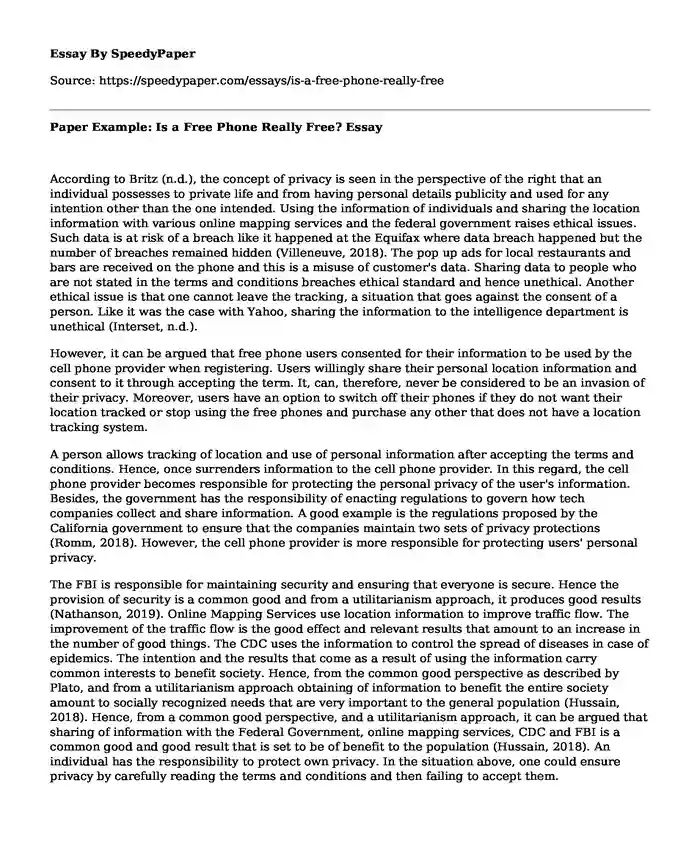
| Type of paper: | Essay |
| Categories: | Information technologies Ethical dilemma Human rights |
| Pages: | 3 |
| Wordcount: | 702 words |
According to Britz (n.d.), the concept of privacy is seen in the perspective of the right that an individual possesses to private life and from having personal details publicity and used for any intention other than the one intended. Using the information of individuals and sharing the location information with various online mapping services and the federal government raises ethical issues. Such data is at risk of a breach like it happened at the Equifax where data breach happened but the number of breaches remained hidden (Villeneuve, 2018). The pop up ads for local restaurants and bars are received on the phone and this is a misuse of customer's data. Sharing data to people who are not stated in the terms and conditions breaches ethical standard and hence unethical. Another ethical issue is that one cannot leave the tracking, a situation that goes against the consent of a person. Like it was the case with Yahoo, sharing the information to the intelligence department is unethical (Interset, n.d.).
However, it can be argued that free phone users consented for their information to be used by the cell phone provider when registering. Users willingly share their personal location information and consent to it through accepting the term. It, can, therefore, never be considered to be an invasion of their privacy. Moreover, users have an option to switch off their phones if they do not want their location tracked or stop using the free phones and purchase any other that does not have a location tracking system.
A person allows tracking of location and use of personal information after accepting the terms and conditions. Hence, once surrenders information to the cell phone provider. In this regard, the cell phone provider becomes responsible for protecting the personal privacy of the user's information. Besides, the government has the responsibility of enacting regulations to govern how tech companies collect and share information. A good example is the regulations proposed by the California government to ensure that the companies maintain two sets of privacy protections (Romm, 2018). However, the cell phone provider is more responsible for protecting users' personal privacy.
The FBI is responsible for maintaining security and ensuring that everyone is secure. Hence the provision of security is a common good and from a utilitarianism approach, it produces good results (Nathanson, 2019). Online Mapping Services use location information to improve traffic flow. The improvement of the traffic flow is the good effect and relevant results that amount to an increase in the number of good things. The CDC uses the information to control the spread of diseases in case of epidemics. The intention and the results that come as a result of using the information carry common interests to benefit society. Hence, from the common good perspective as described by Plato, and from a utilitarianism approach obtaining of information to benefit the entire society amount to socially recognized needs that are very important to the general population (Hussain, 2018). Hence, from a common good perspective, and a utilitarianism approach, it can be argued that sharing of information with the Federal Government, online mapping services, CDC and FBI is a common good and good result that is set to be of benefit to the population (Hussain, 2018). An individual has the responsibility to protect own privacy. In the situation above, one could ensure privacy by carefully reading the terms and conditions and then failing to accept them.
References
Britz, J. Technology as a Threat to Privacy: Ethical Challenges. Retrieved from http://web.simmons.edu/~chen/nit/NIT%2796/96-025-Britz.html
Hussain, W. (2018). The Common Good (Stanford Encyclopedia of Philosophy). Retrieved from https://plato.stanford.edu/entries/common-good/#StruFeatCommGood
Interset. The Complicated Ethics of Data-Breach Disclosure | Interset. Retrieved from https://interset.com/2016/10/06/the-complicated-ethics-of-data-breach-disclosure/
Nathanson, S. (2019). Utilitarianism, Act and Rule | Internet Encyclopedia of Philosophy. Retrieved from https://www.iep.utm.edu/util-a-r/
Romm, T. (2018). California is on the verge of passing a sweeping new online privacy law targeting Facebook, Google, and other tech giants. Washington Post. Retrieved from https://www.washingtonpost.com/technology/2018/06/27/california-is-verge-passing-sweeping-new-online-privacy-law-targeting-facebook-google-other-tech-giants/?noredirect=on&utm_term=.5bd44a001e54
Villeneuve, M. (2018). Equifax Breach Exposed More Consumer Data Than First Disclosed. Insurance Journal. Retrieved from https://www.insurancejournal.com/news/national/2018/02/13/480357.htm
Cite this page
Paper Example: Is a Free Phone Really Free?. (2023, Jan 24). Retrieved from https://speedypaper.net/essays/is-a-free-phone-really-free
Request Removal
If you are the original author of this essay and no longer wish to have it published on the SpeedyPaper website, please click below to request its removal:
- Free Essay: Importance of a College Education to Succeed in Today's Society
- Importance of Certification in Nursing, Essay Sample
- Income Distribution Essay Sample
- Free Essay about Hamas and the United States
- Essay Sample on Types of Regimes
- Free Essay Example: Description of Social Norm
- Essay Sample on Comparative Statistics on The Health Systems
Popular categories




